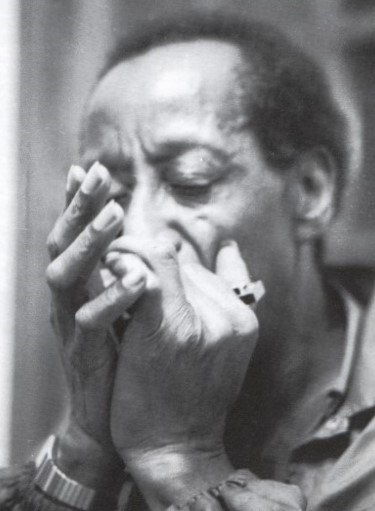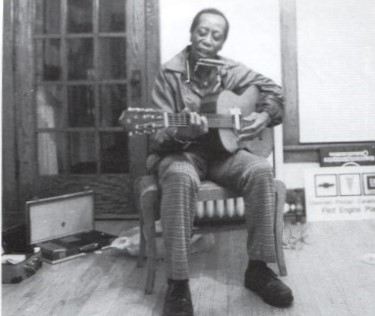Art Form: Blues music
Location(s): Flint (Genesee County)
Isaiah Ross

Isaiah Ross playing the harmonica

Isaiah Ross playing harmonica and guitar in his home
Isaiah "Doc" Ross (1925-1993) was one of Michigan's most well-known and admired blues musicians. Born in Tunica, Mississippi, Doc Ross, "The Harmonica Boss," started playing the harmonica when he was six years old and by his teen years was performing in public. His father, a harmonica player, recognized his son's talent at an early age, telling him, "God sends talent. You hit some keys I never heard before." (1) At age 13, Doc joined The Barber Parker Silver Kings band with Willie Love and shortly after began touring regionally on his own. By the early 1950s, Doc Ross and his Jump & Jive Boys appeared with harmonica legend Sonny Boy Williamson and other blues greats on local radio shows. Doc Ross recorded songs for many record labels during the late 1940s and early 1950s and cut his first record in 1949, on Chess, called "Dr. Ross Boogie." He then went into the armed service, where he picked up his nickname "Doctor" because of his medical position and also because of his compassion for others. He also learned other instruments so that he could play as a one-man band, simultaneously playing guitar, harmonica, bass drum, and cymbal. Because Doc Ross was left-handed, he learned to play the guitar upside down and backwards, just as he learned the harmonica backwards for the same reason. The idea for forming a one-man band stemmed from both the lack of other musicians in the service and from having seen Joe Hill Louis, a one-man band from Memphis. (2)
Returning from service, Doc Ross recorded "Chicago Breakdown" and other songs for Sun Records. In addition to harmonica, drums, and guitar, he also used instruments such as washboard and broom on his records. However, difficulties with the recording industry in Memphis in the 1950s led him to seek employment in Flint for General Motors where he worked for more than 30 years. Doc Ross continued to play music, touring the United States and Europe and performing at blues concerts and festivals until his death. According to Doc Ross, "Blues is truth. If it didn't happen to you, it happened to someone else."
(1) Ross, Isiah in Alan R. Kamuda. "The Doctor Is In." Detroit Free Press. 7 October 1987.
(2) Ross, Isiah in Alan R. Kamuda. "The Doctor Is In." Detroit Free Press. 7 October 1987.





